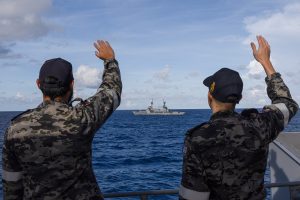Australia takes its international responsibilities seriously, yet as a middle power, it is limited in its resources to contribute to every aspect of insecurity. It needs to make choices based on its own interests and where it can be most helpful. This is the calculation the Australian government has made in refusing a request to send vessels to join Operation Prosperity Guardian – the mission to prevent further attacks by Houthi militia in Yemen on shipping lanes in the Red Sea and the Gulf of Aden.
It doesn’t help that insecurity is on the rise. The Houthi attacks are symbolic of a more chaotic world emerging. Instead of major shocks to the international system, a series of smaller system failures are occurring. These compound and eat away at previously reliable structures. For Australia, this means making often difficult choices about what issues are of greatest importance.
Australia’s Defence Strategic Review released earlier this year reaffirmed that the northeast Indian Ocean was considered part of Australia’s “immediate region,” which may be where Australia has decided to focus its attention. The country’s participation in the invasion of Iraq two decades ago may have chastened Canberra to be wary of straying too far from home.
Yet when it comes to threats to trade, there are different calculations that need to be made. Rather than being divided up into sectors, the Indian Ocean and its connecting waterways should be understood as a single strategic zone. One that transports a number of goods vital to Australia’s normal functioning, in particular oil. While over half of Australia’s oil imports are refined in Singapore, a large percentage of this oil is sourced from the Middle East.
In rejecting the request to join Operation Prosperity Guardian, Canberra has made the calculation that its focus needs to be on China’s changing of conditions in the South China Sea. This may seem like a rational calculation to make. This is clearly Canberra’s most pressing concern, and there are enough other countries invested in the attacks in the Red Sea and Gulf of Aden to provide the hardware necessary to address the problem. Australia’s contribution would be welcome, but not a decisive factor.
Yet another way of understanding this is not just through what hardware can achieve which objectives, but what efforts can deter further attempts at disrupting rules and norms. If we have entered into a period of persistent challenges to good order, how can such a period be overcome? And what are the necessary actions a country like Australia needs to take to help reestablish greater order?
It may seem like Australia should have sent a vessel to participate in Operation Prosperity Guardian to signal its intent and demonstrate its understanding that the system as a whole is under stress, as each point of attack weakens the structure overall. But this effort is a more nebulous approach, and may not factor in the full calculations Canberra is making in regard to what it sees as the most substantial threats to global order.
Yet even this may not be so simple. If China is Australia’s primary concern then for Canberra understanding how Beijing interprets its actions is critical. Does China see a multi-national force in the Red Sea and Gulf of Aden as evidence that countries are willing to work together to defend rules and norms and this will lead to Beijing thinking twice about further breaking of the rules? Or does it see Australia’s decision to contain its resources to its own region as a sign that Australia is serious about preventing further rule-breaking in the South China Sea?
It could be either. Ideally, Australia would have the resources to commit to both, but a decision has been made that it doesn’t. This would no doubt have been a difficult decision to make, especially given Australia’s critical partnership with the United States, which is leading Operation Prosperity Guardian. But with limited resources, there are always going to be trade-offs and this is clearly an issue where Canberra feels too spread thin.
The hope for Australia will be that the attacks on container ships in the Red Sea and Gulf of Aden can be subdued quickly through the responses of those that have dedicated assets to the region. The longer these incidents persist the more other forces bent on destabilization will feel emboldened to challenge rules and norms, whether there be non-state or state actors. If not, an age of instability may lead to much more difficult trade-offs being made in Canberra.

































